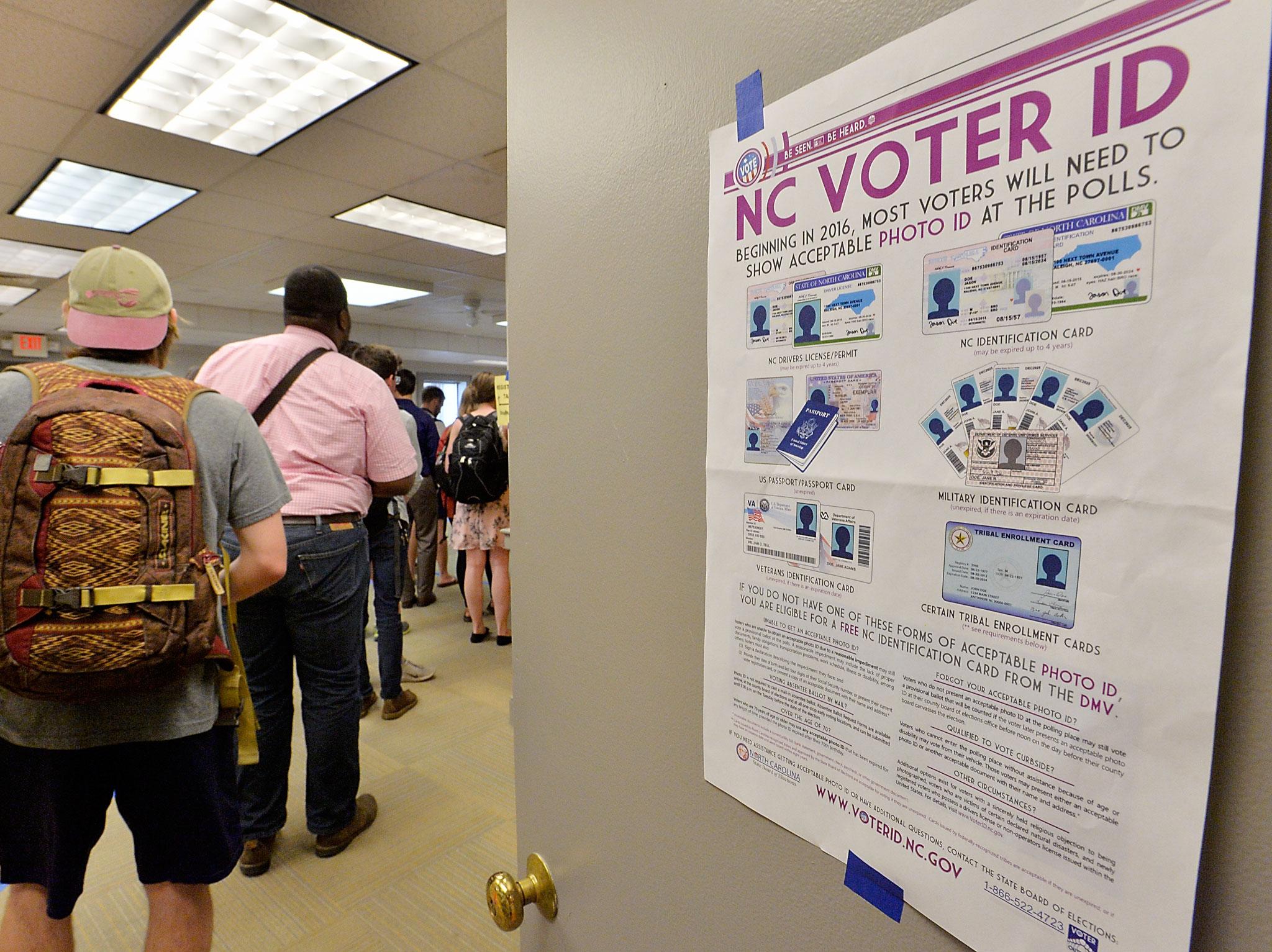Federal court strikes down discriminatory North Carolina voter ID law
The judges found that the law was implemented with 'discriminatory intent'

Your support helps us to tell the story
From reproductive rights to climate change to Big Tech, The Independent is on the ground when the story is developing. Whether it's investigating the financials of Elon Musk's pro-Trump PAC or producing our latest documentary, 'The A Word', which shines a light on the American women fighting for reproductive rights, we know how important it is to parse out the facts from the messaging.
At such a critical moment in US history, we need reporters on the ground. Your donation allows us to keep sending journalists to speak to both sides of the story.
The Independent is trusted by Americans across the entire political spectrum. And unlike many other quality news outlets, we choose not to lock Americans out of our reporting and analysis with paywalls. We believe quality journalism should be available to everyone, paid for by those who can afford it.
Your support makes all the difference.A federal appeals court has sided with campaigners who accused conservative legislators of hampering the ability of black people to vote.
Civil rights activists challenged a voter identification law drafted in 2013, which they said have the potential to disenfranchise countless people. Opponents of such laws said the required documentation disproportionately affected voters of colour who were unable to obtain such identification.
In a damning landmark decision, the 4th Circuit Court of Appeals sided with opponents of the law and found that it targeted black voters “with almost surgical precision” and imposed “cures for problems that did not exist”. In doing so, North Carolina legislators violated the Constitution and the Voting Rights Act, the three-judge panel said.
The decision comes after a Federal District Court had upheld the law in late April, in the midst of an election year and inflamed racial tensions in the US.
“In holding that the legislature did not enact the challenged provisions with discriminatory intent,” the opinion said, “the court seems to have missed the forest in carefully surveying the many trees.”
The judges also found evidence of discrimination in the instance of early voting, a process in which a large percentage of black voters participated.
“African Americans disproportionately used the first seven days of early voting,” it said. “After receipt of this racial data, the General Assembly amended the bill to eliminate the first week of early voting, shortening the total early voting period from seventeen to ten days.”
Allison Riggs, lead lawyer for the League of Women Voters – who sued the state alongside the Department of Justice and NAACP – called the decision a “strong rebuke” to the 2013 changes.
“It’s a powerful precedent that … federal courts will protect voting rights of voters of colour,” she said.
President of the North Carolina chapter of the NAACP, Rev William Barber, said that the court’s decision was “ a vindication of our constitutional and moral critique and challenge to the constitutional extremism of our government”.
Republicans who supported the voter ID laws maintained that they were trying to prevent voter fraud with the revisions – a claim the court dismissed.
“We can only wonder if the intent is to reopen the door to voter fraud, potentially allowing fellow Democrat politicians … to steal the election,” North Carolina Senate leader Phil Berger and House Speaker Tim Moore said in a joint statement.
Both Attorney General Loretta Lynch and Hillary Clinton lauded the decision by the three judges – all of whom were appointed by a Democratic president.
The revisions by North Carolina legislators required photo ID, restricted early voting, prohibited same-day registration, as well as the ability of voters to cast out-of-precinct provisional ballots within their counties.
However the court determined that these restrictions affected black voters significantly.
Similar laws in Texas and Wisconsin were struck down in federal courts over the last month.
“We recognize that elections have consequences,” the court said, “but winning an election does not empower anyone in any party to engage in purposeful racial discrimination.”